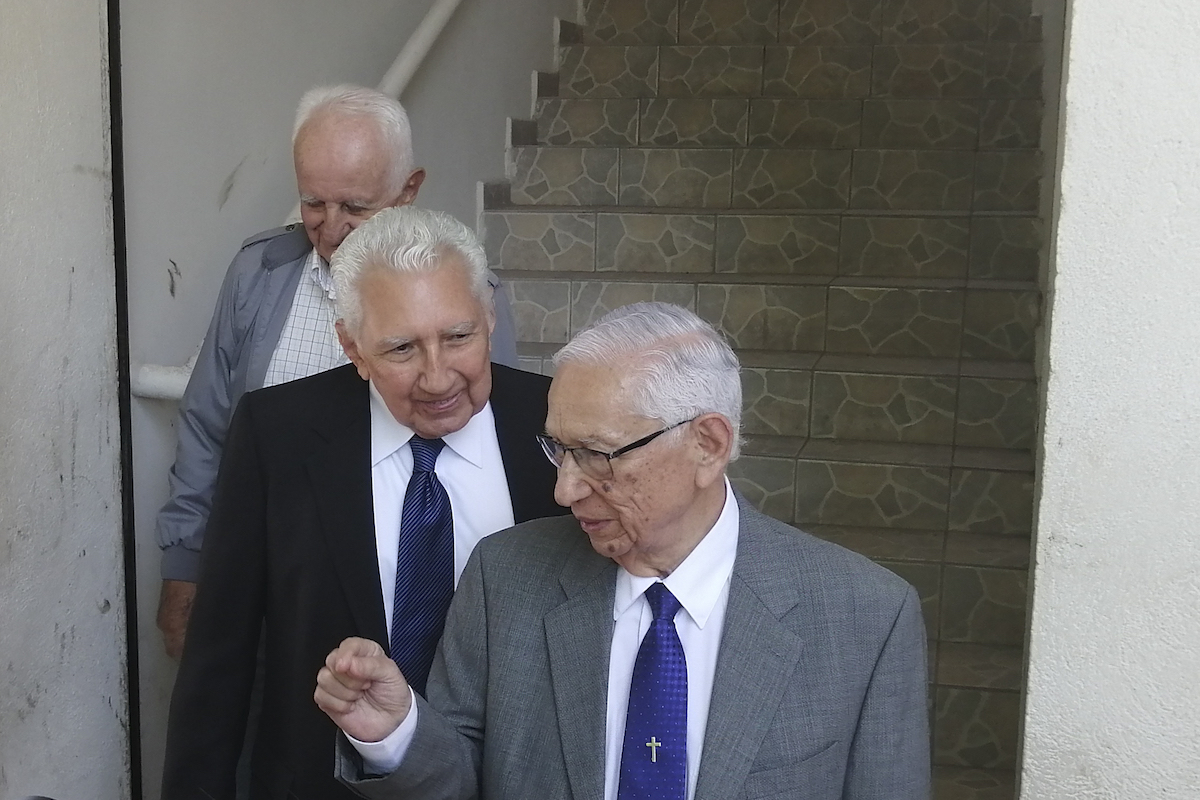

In this photo distributed by human rights organization Cristosal, former defense minister José Guillermo García talks to journalists as he leaves the court along with Rafael Flores Lima, former head of the armed forces, center left, and Jesús Gabriel Contreras, former head of operations for the armed forces, in San Francisco Gotera, El Salvador, Thursday, July 18, 2019. (Cristosal via AP)
By MARCOS ALEMÁN, Associated Press
SAN SALVADOR, El Salvador (AP) — A judge ruled Thursday that 17 former members of El Salvador’s military, including ex-leaders of the armed forces, will also face charges of torture, forced disappearance and forced displacement related to the 1981 El Mozote massacre, a gruesome point in the country’s civil war.
The new charges encompass alleged crimes against humanity stemming from the incident in the early years of the conflict, according to the ruling in San Francisco Gotera, a town northeast of the capital. The defendants already were on trial on charges that include murder, rape, theft and terrorism.
Four of the 17 weren’t in court because of illness or travel outside El Salvador. None are being held, but the court said Thursday that the defendants must stay in the country.
The government and insurgents signed a peace accord in 1992 to end the 12-year war, which killed more than 75,000 people.
The massacre in the village of El Mozote, 75 miles (120 kilometers) from San Salvador, took place over three days in December 1981. The Atlacatl battalion, which was trained in counterinsurgency tactics in the U.S., set out to find guerrillas but ended up killing civilians.
The official death toll was 989, including farmers and children. Many of the victims’ bodies were thrown into a church that was burned to the ground. In one mass grave, forensic analysts found 136 skeletal remains of children who averaged 6 years of age.
A 1983 report by the United Nations Truth Commission blamed the massacre on Col. Domingo Monterrosa, commander of the Atlacatl battalion; Col. Armando Azmitia, and six other officers who were never put on trial because of an amnesty law. Monterrosa and Azmitia died at El Mozote in 1984 when a helicopter in which they were flying exploded when fired on by guerrillas.
Among those facing new charges are former Defense Minister José Guillermo García; retired Gen. Rafael Flores Lima, a former head of the armed forces; and retired Gen. Juan Rafael Bustillo, former leader of the air force.
Bustillo has repeatedly claimed his innocence and petitioned the judge that he not be required to come to court for fear of being harmed by the victims’ families.
Victims’ relatives showed up at the hearing to demand justice, holding signs with phrases like: “The murderers want us to forget so they can secure their impunity” and “Neither forgiveness, nor forgetting.”
In mapping out the chain of military command and weighing the evidence, the court said it took into account opinions from military experts, historians and anthropologists.
Judge Jorge Guzmán Urquilla ordered the investigation reopened after El Salvador’s Supreme Court repealed the 1993 General Amnesty Law that had prevented war crimes and crimes against humanity from being investigated.
At the beginning of the trial, in early 2017, Guzmán Urquilla subpoenaed 18 former military members, including García and Flores Lima.
On Thursday, the judge told Col. Jesús Gabriel Contreras Alfaro, who was the head of operations for the armed forces in 1981, that evidence suggests he participated in the massacre.
Contreras Alfaro defended himself, saying that the events in El Mozote did not take place in the framework of a “regular war.”
David Morales, the one-time head of El Salvador’s human rights commission who now represents the victims, said he hasn’t heard the accused express any remorse, accountability or solidarity with the victims.
“I didn’t hear anyone ask for forgiveness, or say sorry,” Morales said.


